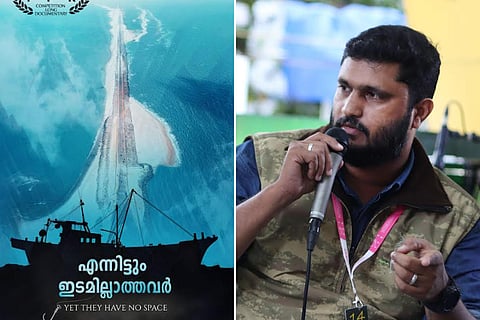

Amidst the sound of waves is the voice of a man asking in Tamil, “For 30 years now we have been living here as refugees, should we continue living like that.” The voice fades away as the title of Prince Pangadan’s documentary Ennittum Idam Illathavar /Yet They Have No Space appears on the screen. The film, on the lives of the Sri Lankan refugees scattered across India – particularly those in Kerala – was screened at the International Documentary and Short Film Festival of Kerala (IDSFFK). Prince, a journalist, found the need to tell the story when he came across that voice of the Sri Lankan Tamil man, asking how long they should continue living as refugees in India.
“What struck me most while working on the documentary was the fate of the children of these refugees. They were born in India, they have only known life in India. But they are not accepted as Indians. They do not have citizenship here, just as their parents don’t. They don’t belong to Sri Lanka either,” Prince tells TNM.
His documentary details the different phases of migration of lakhs of Sri Lankan Tamils every time there was a conflict or war. C Valatheeswaran, a researcher who appears in the documentary, says that until 1991, when Prime Minister Rajiv Gandhi was killed by the LTTE (Liberation Tigers of Tamil Eelam), the refugees were wholeheartedly welcomed in Tamil Nadu and treated as kin. But the assassination had immediate effects – the camps receiving the refugees in Tamil Nadu reduced by a large number. The refugees never got the right to have government jobs or own property.
Prince, who is based in Kerala, went to see the migrants who moved to settlements in Kollam’s Kulathupuzha and Pathanamthitta’s Gavi. “After the Sirimavo-Shastri Pact in 1964, there was an agreement between the two countries that guaranteed Sri Lankan citizenship to three lakh Indian Tamils who had moved there during the British rule and Indian citizenship to more than five lakh people who would move back to India. Those who came back settled in several places, including Andhra and Kerala (apart from Tamil Nadu). They got their rights too.”
But many other Tamils who moved later – during the periods of unrest in Sri Lanka, fearing for their lives – didn’t get citizenship or basic rights. Prince doesn’t add his own perspective of the politics behind citizenship but lets Valatheeswaran speak out.
Valatheeswaran compares the situation to the more recent protests over the Citizenship Amendment Act (CAA) and National Register of Citizens (NRC) in India, which too had brought up questions over citizenship being discriminatory to Muslims. However, in the case of refugees from Sri Lanka, they are Hindus but facing the same situation, he says.
“The refugees would be taken across the sea (illegally) and dropped somewhere in Dhanushkodi, after they pay huge amounts of money. They’d have sold everything they had to get away. Even then it’d be risking their lives because the Sri Lankan navy may shoot them at sea – as many as 70 people have once died in this way. Once they reach the shore, it is still a sad state for them. Earlier they used to be taken to jails. Later it became camps but these too are kept in poor condition. The DMK government (in Tamil Nadu) is understood to be taking steps to improve the camp conditions,” Prince adds.